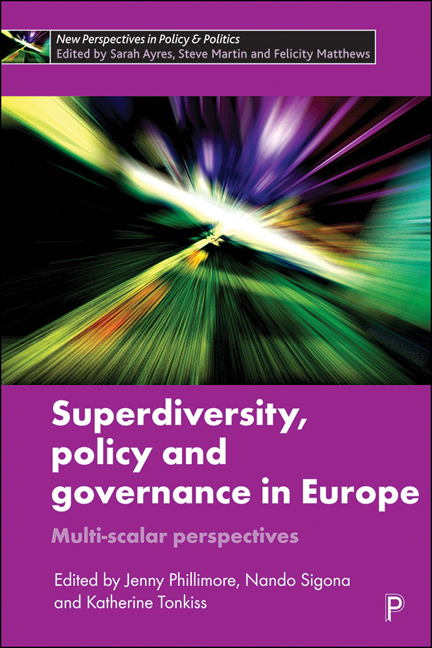Book contents
- Frontmatter
- Contents
- List of Figures and Tables
- Notes on Contributors
- Introduction: Superdiversity, Policy and Governance in Europe
- Chapter One Managing Superdiversity? Examining the Intercultural Policy Turn in Europe
- Chapter Two Mainstreaming in Response to Superdiversity? The Governance of Migration-Related Diversity in France, The UK and the Netherlands
- Chapter Three Making the Most of Superdiversity: Notes on the Potential of a New Approach
- Chapter Four Superdiversity and Sub-National Autonomous Regions: Perspectives from the South Tyrolean Case
- Chapter Five Transmigration: The Rise of Flexible Migration Strategies as Part of Superdiversity
- Chapter Six Superdiversity, Multiculturalism and Local Policies: A Study on European Cities
- Chapter Seven Integrating Superdiversity in Urban Governance: The Case of Inner-city Lisbon
- Chapter Eight Urban Planning and the Challenge of Superdiversity
- Chapter Nine Superdiversity in the Post-Industrial City: A Comparative Analysis of Backlash Narratives in Six European Neighbourhoods
- Index
Chapter Nine - Superdiversity in the Post-Industrial City: A Comparative Analysis of Backlash Narratives in Six European Neighbourhoods
Published online by Cambridge University Press: 04 March 2021
- Frontmatter
- Contents
- List of Figures and Tables
- Notes on Contributors
- Introduction: Superdiversity, Policy and Governance in Europe
- Chapter One Managing Superdiversity? Examining the Intercultural Policy Turn in Europe
- Chapter Two Mainstreaming in Response to Superdiversity? The Governance of Migration-Related Diversity in France, The UK and the Netherlands
- Chapter Three Making the Most of Superdiversity: Notes on the Potential of a New Approach
- Chapter Four Superdiversity and Sub-National Autonomous Regions: Perspectives from the South Tyrolean Case
- Chapter Five Transmigration: The Rise of Flexible Migration Strategies as Part of Superdiversity
- Chapter Six Superdiversity, Multiculturalism and Local Policies: A Study on European Cities
- Chapter Seven Integrating Superdiversity in Urban Governance: The Case of Inner-city Lisbon
- Chapter Eight Urban Planning and the Challenge of Superdiversity
- Chapter Nine Superdiversity in the Post-Industrial City: A Comparative Analysis of Backlash Narratives in Six European Neighbourhoods
- Index
Summary
Introduction
Over the past decade, the concept of superdiversity has alerted us to the proliferation of differences characterising urban spaces, making us question existing categories and re-think the multilayered nature of social configurations. Demographics across Europe point to an increasing number of local ‘majority minority’ areas, where the national majority population no longer constitutes a local majority. Similarly, there has also been a diversification of origin countries over the past 30 years as well as a greater recognition of multivariable migration configurations (Meissner and Vertovec, 2015, 543, 550).
Superdiversity has also, to put it crudely, proved a new way of mapping familiar spaces, however. Why new? Why familiar? Steve Vertovec's pathbreaking introduction to ‘Superdiversity and its implications’ operated with a broad-brush approach, using UK national level quantitative data to demonstrate superdiversity as ‘a new kind of complexity surpassing anything the country has previously experienced’ (Vertovec, 2007, 1024). Much subsequent work into this complexity would, however, seem situated in gritty inner-city areas already recognised as diverse according to previously established categories based on race and ethnicity (Wessendorf, 2013; Hall, 2012). But many such studies are also subject to a ‘territorial fallacy’ whereby the space analysed becomes an island unto itself, disconnected from a wider urban context (Soja, 2001), with geographical boundaries pre-defined in the research design rather than emerging from the actual research. Whereas there is a long-standing recognition of the local as globally produced, analyses often fail to situate the superdiverse locality within the broader context of socio-economic transformation brokered by post-industrialism and neoliberalism (Soja, 2001; Hickman et al, 2012).
It is the aim of this chapter to draw attention how this broader context impact localised social dynamics. The main question is, accordingly: How does the urban setting condition emerging us/them distinctions at neighbourhood level? This framing represents an understanding of inter-group dynamics as processes in situational time, positioning the city as a generative space rather than a mere canvas (Walter and Uitermark, 2016, 878). Accordingly, this focus on underlying urban dynamics marks a departure from approaches based on pre-defined categories based on migrant status, ethnicity, religion or class.
- Type
- Chapter
- Information
- Superdiversity, Policy and Governance in EuropeMulti-scalar Perspectives, pp. 192 - 214Publisher: Bristol University PressPrint publication year: 2020



